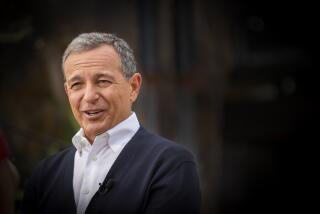Big Money on Wall Street : Executives Reap Rich Rewards as Securities Industry Logs a Record Year
- Share via
NEW YORK — Wall Street executives are cashing in on the most profitable year ever for investment banks and brokerage houses as low interest rates, a surging stock market and record underwritings of new stock and bond issues make the securities industry a shining exception in an otherwise dreary economic firmament.
Proxy statements filed recently by securities firms disclose that pay for 1991 is up for top executives of big public firms.
For the record:
12:00 a.m. March 27, 1992 For the Record
Los Angeles Times Friday March 27, 1992 Home Edition Business Part D Page 2 Column 3 Financial Desk 1 inches; 34 words Type of Material: Correction
Howard Clark Jr.: In Thursday’s editions, the person identified in a photograph as Shearson Lehman Chairman Howard Clark Jr. was actually Howard L. Clark, former chairman of American Express Co. Howard Clark Jr.’s picture appears above.
PHOTO: Howard Clark Jr.
Merrill Lynch & Co. officers have reaped the richest rewards to date. Chairman William A. Schreyer was awarded a total 1991 package worth $16.8 million. Cash and bonuses totaled $5.8 million, and Schreyer collected options on 300,000 shares priced at $21.375, which can be exercised in equal amounts over four years. Since Merrill’s stock closed at $58.175 on Wednesday, Schreyer’s options have a face value of about $11 million.
Merrill President Daniel P. Tully wasn’t far behind, with cash compensation of $4.9 million and stock options with a face value of $9.4 million for a total of $14.3 million. Eleven other Merrill officers earned an average of $5.2 million each including options. The outsize pay reflected Merrill’s most profitable year ever, when the nation’s biggest brokerage earned $696 million.
“Wall Street is an eat-what-you-shoot environment,” says Brooks T. Chamberlin, managing director of the executive-search firm Korn/Ferry International. He points out that investment banking and brokerage are cyclical businesses that pay well during good years but offer no guarantee of the future. Most Wall Streeters earn relatively small salaries and depend on fluctuating bonuses for the lion’s share of their income.
A painful recession in the late 1980s wiped out one of every five Wall Street jobs. Those who were left clung to their entitlements. A 1990 study by Vincent Perro in the New York office of human-resources consultants Sibson & Co. showed that in the late 1980s, when Wall Street’s results drooped, the firms funneled an ever-larger percentage of distributable funds to their employees as pay rather than to their shareholders as profits.
It hasn’t taken a sustained recovery to break out the champagne. Bear Stearns Cos. Chairman Alan (Ace) Greenberg, whose firm’s fiscal year ended last June 30, earned $5.3 million, a 26% increase over the previous year. Howard Clark Jr., chairman of the American Express unit Shearson Lehman Bros., was paid $2.8 million, double his 1990 figure. And Frank Zarb, chairman of Primerica’s subsidiary Smith Barney, Harris Upham, made $2.3 million, a 44% increase.
Noticeably absent from the celebrants was Warren E. Buffett, interim chairman of Salomon Bros., a subsidiary of Salomon Inc. Buffett accepted only $1 in compensation for his emergency takeover of the embattled firm last August after federal regulatory officials forced former Chairman John Gutfreund to resign in the wake of a Treasury auction scandal. President Deryck Maughan, who took over in August, earned $2 million in 1991 salary and bonus plus $3.3 million from deferred-compensation plans.
Big firms such as PaineWebber Group, Morgan Stanley Group and Sears, Roebuck’s unit Dean, Witter, Reynolds haven’t yet disclosed executive pay. Their proxy statements are expected next week.
Korn/Ferry’s Chamberlin says Wall Street’s rank-and-file professionals--such as bond traders, corporate-finance generalists, merger-and-acquisitions specialists and institutional-bond salesmen--saw increases in 1991 of about 20% to 25% in their paychecks.
The Wall Street boom shows no sign of abating. IDD Information Services reports that total underwriting fees earned by securities firms in the first quarter of 1992 already equal the previous quarterly record of $1.6 billion established a year ago. With one week of transactions yet to be completed, this quarter promises to set a new record.
During all of 1991, Wall Street firms raked in $4.61 billion in underwriting fees, the highest figure since 1986.
Record 1991 profits for securities firms. . . Pretax profits for New York Stock Exchange members rebounded from a 1990 loss, due in part to a strong market, demand for new stock and bond issues and the Federal Reserve Board’s cutting of the discount rate.
Pretax Profits (figures in billions of dollars) 1981: 2.1 1982: 3.0 1983: 3.8 1984: 1.6 1985: 4.1 1986: 5.5 1987: 1.1 1988: 2.5 1989: 1.8 1990: -0.2 1991*: 5.8 * Estimate
Merril Lynch William Schreyer 1991 pay: $16.8 million* 1990 pay: $3.9 million
Bear Stearns Alan Greenberg 1991 pay: $5.3 million** 1990 pay: $4.2 million
Smith Barney, Harris Upham Frank Zarb 1991 pay: $2.3 million 1990 pay: $1.6 million
Shearson Lehman Bros. Howard Clark Jr. 1991 pay: $2.8 million 1990 pay: $1.4 million *Includes the face value of stock options to be vested over four years: **For fiscal year ended June 30, 1991 Note: Paine Webber Group, Morgan Stanely Group and Dean Witter Reynolds inc. Proxies are due out next week. Sources: Company proxies
More to Read
Inside the business of entertainment
The Wide Shot brings you news, analysis and insights on everything from streaming wars to production — and what it all means for the future.
You may occasionally receive promotional content from the Los Angeles Times.










